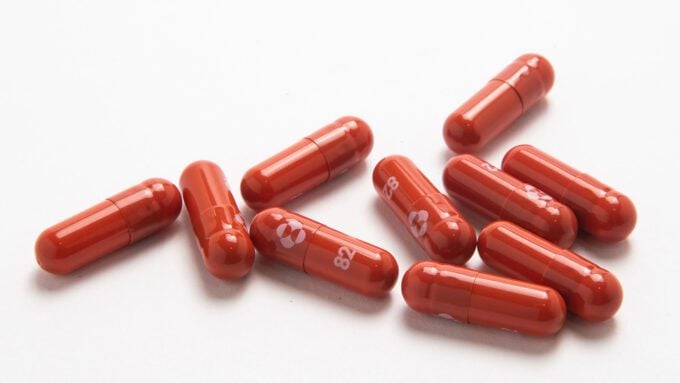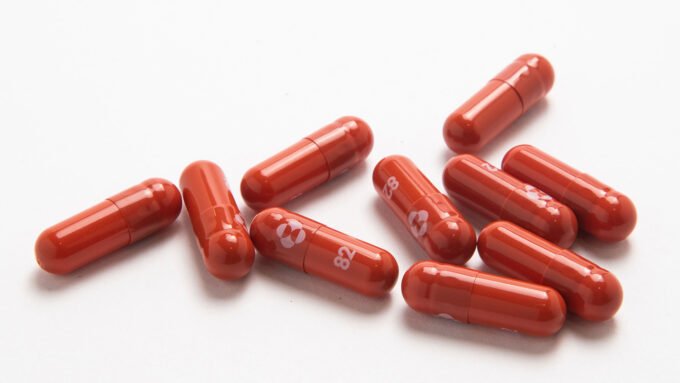
One day after the authorization of the Pfizer pill, the U.S. Food and Drug Administration issued an emergency use authorization for Merck’s molnupiravir antiviral pill for the treatment of COVID-19 infection on Thursday.
“Today’s authorization provides an additional treatment option against the COVID-19 virus in the form of a pill that can be taken orally. Molnupiravir is limited to situations where other FDA-authorized treatments for COVID-19 are inaccessible or are not clinically appropriate and will be a useful treatment option for some patients with COVID-19 at high risk of hospitalization or death. As new variants of the virus continue to emerge, it is crucial to expand the country’s arsenal of COVID-19 therapies using emergency use authorization, while continuing to generate additional data on their safety and effectiveness,” said Patrizia Cavazzoni, M.D., director of the FDA’s Center for Drug Evaluation and Research.
Molnupiravir antiviral pill for the treatment of mild-to-moderate COVID-19 for certain high-risk adult patients and for whom alternative COVID-19 treatments authorized by FDA are not accessible or clinically appropriate.
Molnupiravir is available by prescription only and should be initiated as soon as possible after diagnosis of COVID-19 and within five days of symptom onset. It is not authorized for patients younger than 18 years of age because molnupiravir may affect bone and cartilage growth, said in the press release.
Today, the U.S. Food and Drug Administration issued an emergency use authorization (EUA) for Merck’s molnupiravir for the treatment of mild-to-moderate coronavirus disease (COVID-19) in adults with positive results of direct SARS-CoV-2 viral testing, and who are at high risk for progression to severe COVID-19, including hospitalization or death, and for whom alternative COVID-19 treatment options authorized by the FDA are not accessible or clinically appropriate. Molnupiravir is available by prescription only and should be initiated as soon as possible after diagnosis of COVID-19 and within five days of symptom onset.
Molnupiravir is not authorized for use in patients younger than 18 years of age because molnupiravir may affect bone and cartilage growth. It is not authorized for the pre-exposure or post-exposure prevention of COVID-19 or for initiation of treatment in patients hospitalized due to COVID-19 because benefit of treatment has not been observed in people when treatment started after hospitalization due to COVID-19.
Molnupiravir is not a substitute for vaccination in individuals for whom COVID-19 vaccination and a booster dose are recommended. The FDA has approved one vaccine and authorized others to prevent COVID-19 and serious clinical outcomes associated with a COVID-19 infection, including hospitalization and death. The FDA urges the public to get vaccinated and receive a booster if eligible. Learn more about FDA-approved or -authorized COVID-19 vaccines.
Molnupiravir is a medication that works by introducing errors into the SARS-CoV-2 virus’ genetic code, which prevents the virus from further replicating. Molnupiravir is administered as four 200 milligram capsules taken orally every 12 hours for five days, for a total of 40 capsules. Molnupiravir is not authorized for use for longer than five consecutive days.
Read more here.
The authorization of Merck’s pill comes after the FDA authorized Pfizer pill as COVID-19 home treatment.
Merck Pharmaceuticals is the same company to identify Ivermectin in the 1970s during a veterinary drug screening. Some people online are claiming that Merck’s molnupiravir is a rebranded version of Ivermectin.
Same basic design as ivermectin and HCQ 20 dollars vs 700 dollars. How many died because treatments were demonized
— Bill Cohn (@BillCohn6) December 23, 2021
Merck just introduce A pill called molnupiravir to help fight of COVID it supposed to works just like Ivermectin but the difference is they are charging $712 a bottle. Merck is the same company that distribute ivermectin what a coincidence
— Ez
(@AntBanging) October 10, 2021
“When absorbed into the body, molnupiravir is broken down into one of the building blocks that make up RNA.Early studies showed the small, synthetic molecule was potent against viruses known as RNA viruses, which use a genetic material similar to DNA,” USA Today reported.
There are concerns that there are persistent side-effect with mutagenic molnupiravir. Mutagenic drugs can cause either birth defects or cancer.
Drug Discovery cited:
The lack of long-term safety data concerning molnupiravir could be an obstacle for skeptical patients. That’s especially the case given early conclusions that there are “persistent side-effect concerns with mutagenic molnupiravir,” as a Clinical Trials Arena article observed. That article goes on to cite Ron Swanstrom, a professor at the University of North Carolina, Chapel Hill, who in January questioned “whether molnupiravir could be metabolized into a precursor of DNA,” and then “enter the host cell nucleus, leading to oncogenesis.”
In theory, mutagenic drugs can cause either birth defects or cancer. The inclusion criteria for the Phase 3 study of molnupiravir required males to refrain from donating sperm and either agree to abstain from sex or use contraception. Females were required to not be pregnant or breastfeeding. Women who were of child-bearing age had to agree to use a highly effective contraceptive method or be abstinent for 28 days from the start of the study intervention. In addition, women of childbearing age must have had a negative highly sensitive pregnancy test within 24 hours before receiving the first dose of medicine.
Merck did not immediately respond to a request for comment. However, in a conference call last week, Merck virologist Daria Hazuda stressed that Merck had seen “no evidence of the potential for mutagenicity” for this agent. She concluded that the company is “very comfortable that the drug will be safe if used as intended.”
Molnupiravir is a prodrug of nucleoside analogue β-D-N4-hydroxycytidine (NHC), which could potentially be incorporated in mammalian DNA.
One study determined there was evidence that the drug could potentially drive mutagenesis in both viral RNA and mammalian DNA. “It seems unlikely that a short course of therapy would spare the host from this exposure because both RNA precursors that affect the virus and DNA precursors that would affect the host pass through the common ribonucleoside diphosphate intermediate,” concludes an article in the Journal of Infectious Diseases.
Treatment drugs Ivermectin and hydroxychloroquine have been used against the coronvirus with success since 2020. But now the medical elites are finally proposing their own treatment pills produced by Big Pharma friendlies.
The post JUST IN: FDA Authorizes Merck Pill as Second COVID-19 Home Treatment Pill …Sort of Like Ivermectin appeared first on The Gateway Pundit.
